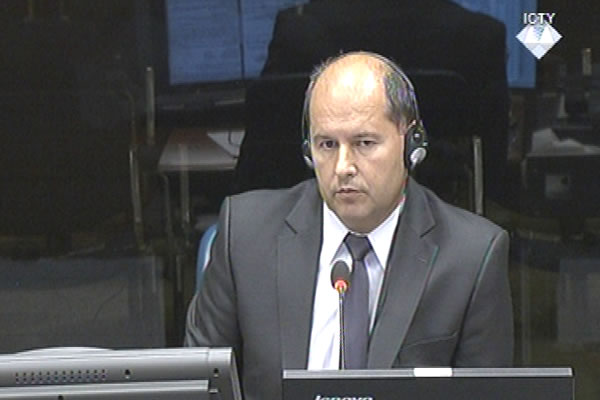Home
WERE MLADIC'S TROOPS RESPONSIBLE FOR CRIME IN GRABOVICA?
Vojislav Krsic, an officer in the Kotor Varos brigade, claims that Serb civilians killed 150 Muslims in the village of Grabovica in November 1992, although he admits that the army, which held the prisoners, was 'in a way' responsible for their fate
 Vojislav Krsic, defence witness at Rako Mladic trial
Vojislav Krsic, defence witness at Rako Mladic trial Kotor Varos is one of the six municipalities in BH where the persecution of Muslims and Croats reached the scale of genocide, according to the indictment against Ratko Mladic. One of the many crimes in the area happened in early November 1992 when about 150 men were killed in the village of Grabovica. The first witness called by the prosecution, Elvedin Pasic, testified about the incident. His father and uncle had been killed in Grabovica. An insider who had been a soldier in the Bosnian Serb army also testified about the incident as a prosecution witness. His identity remained protected. Both witnesses claimed that before the Muslim men were killed, they were held by the Serb troops in the local elementary school. This claim was corroborated by former officer in the Kotor Varos Light Infantry Brigade, Vojislav Krsic, who testified in Ratko Mladic's defense today. He did not provide any further insights.
Krsic denied that the troops killed the men, shifting the blame on Serb civilians seeking out for revenge. In his statement to the defense and his evidence today he claimed that in early November 1992 the Grabovica company captured a large group of Muslims from the village of Vecici. The brigade officers, including its commander Dusan Novakovic and the witness who was Novakovic's assistant for operations, headed for Grabovica to help 'bring in the column'.
The group of men, women and children was taken to the football field where commander Novakovic was waiting for them. They were all transferred to the local elementary school where the women and children were put in the rooms on the ground floor, while men were taken upstairs. As Krsic said, in the school, he first made a list of women and children - there were about 40 of them, in his estimate - and then he made a list of the men, about 150 of them, all told. Contrary to what the prosecution witnesses had said, Krsic claimed that no one was beaten in the school and that the prisoners' hands were not tied with wire. The next day, the women and children were transported to Travnik, he recounted. The only incident he is aware of occurred at that time. In his statement, he says that a local Serb killed a Muslim.
The witness was ordered to go back to Kotor Varos and he thus has no firsthand knowledge of the fate of the Muslim men in the Grabovica school. He soon heard that 'there were scenes of chaos there'. The brigade security officer Mirko Kosic came to see him and told him, 'Vojkan, fuck it, there has been a problem, the population of Grabovica fucked up and those people got killed.' Krsic was, as he said today, 'taken aback and in a state of shock'. He was allegedly asked to produce a statement and to submit it to the 1st Krajina Corps Command, and he complied. Neither the prosecution nor the defense has been able to trace the document. When the judges asked him if the Bosnian Serb army had ever conducted a proper investigation of the crime in Grabovica, the witness said he had 'no knowledge of that'.
In a bid to point the finger of blame at the army for the crime in Grabovica, prosecutor Bibles showed the witness the minutes from the meeting in the Kotor Varos war presidency on 4 November 1992. The minutes state that '150 fighters and civilians' surrendered and that their fate would be decided by the commander of the Koto Varos brigade, Dusan Novakovic, among other people. When the witness was asked if Novakovic was in charge of the prisoners in Grabovica, he confirmed it, but only for as long as the army personnel remained there. This prompted the prosecutor to ask a direct question, 'Was the Kotor Varos brigade responsible for the Muslims in Grabovica?' When Krsic admitted that 'in a way it was', the prosecutor had no further questions for him.
In the re-examination, defense counsel Lukic asked Krsic if it was easy to find information about the crime in Grabovica. The witness told him that it was 'a taboo topic'; people were unwilling to talk about it at the time and are unwilling to discuss it even today.
